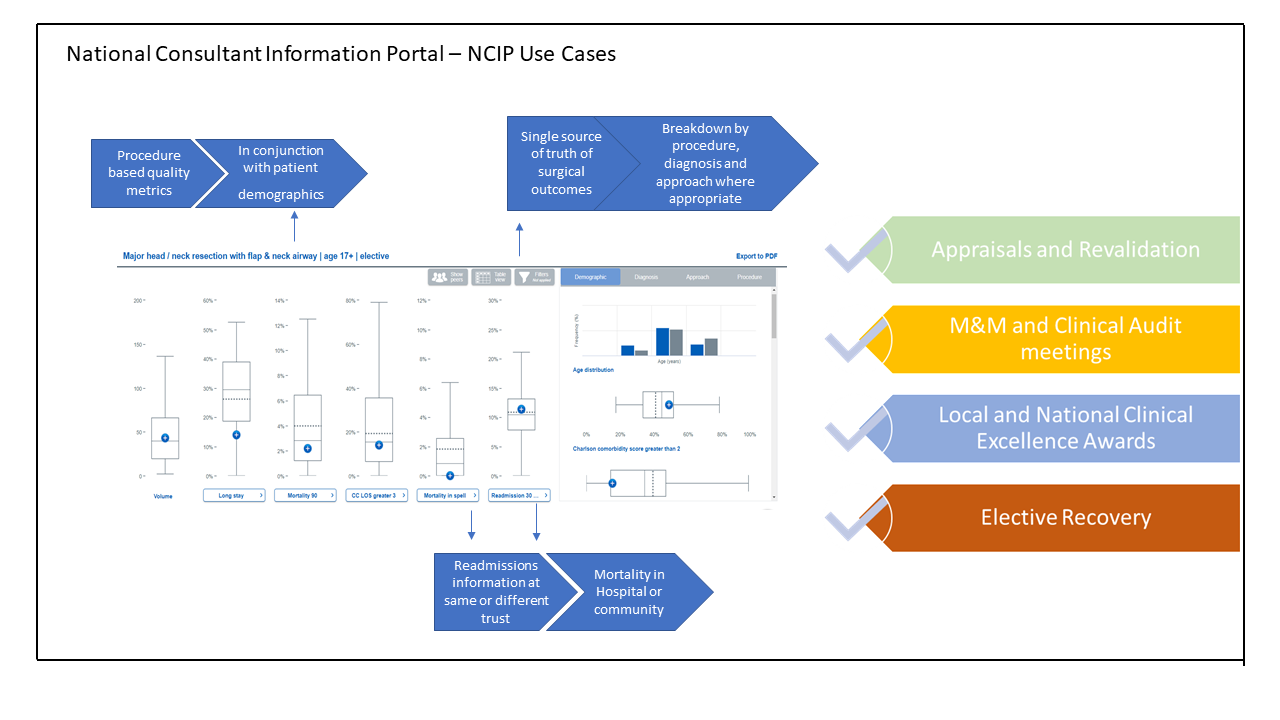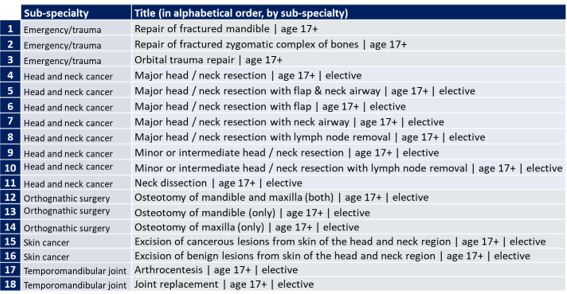Supporting consultant surgeons with their learning and development
The National Consultant Information Programme (NCIP) was initiated in 2018 to support consultant surgeons with their learning and continuous self-development of their practice. NCIP’s aim is to support clinical quality improvement for the benefit of patients.
NCIP provides consultants with a single repository of their surgical outcomes data across a range of surgical procedures, allowing them to drill down into individual patient-level information via pseudonymised patient records to allow for full interrogation of consultant-level outcomes-data.
NCIP users and key use cases
NCIP access is restricted to individual consultants, Responsible Officers and Medical Directors.
- Consultant Surgeons; can see their own activity at their designated hospital
- Medical Directors; can see activity for consultants at their own trust
- Responsible Officers; can see activity for their designated consultants at their designated provider
NCIP has four key uses which aim to support clinical quality improvement:
- Appraisal and revalidation: provides a lever for regular usage and a mechanism for consultants to take individual responsibility for their practice based on high quality, objective data.
- Mortality/Morbidity and Clinical Audit meetings: These meetings are the key mechanism to engender improvement across the team as well as enhancing uptake.
- Clinical excellence awards: These awards allow consultants to evidence excellence. Another lever of motivation to increase uptake.
- Elective recovery: enable consultants to take responsibility for key metrics like day case rates, cases per list, reduction in unnecessary procedures and readmissions in line with GIRFT and Model Health System to enable support for recovery from a consultant perspective
Figure 1: NCIP Procedure Dashboard for major head/neck resection with flap & neck airway |age 17+|elective

Developed by the profession for the profession - working in partnership with BAOMS to produce high quality data content
The programme is currently focusing on elective surgical specialties and has developed metrics in collaboration with the Getting It Right First Time (GIRFT) programme, NCIP Clinical Leads and specialty and sub-specialty associations, including BAOMS. NCIP has the full support of the Royal College of Surgeons and Academy of Medical Royal Colleges. A number of early adopter NCIP trusts are now using the tool as part of the annual appraisal process.
The portal uses Hospital Episode Statistics (HES) data to source consultant activity for a number of specialty procedures. Today, the NCIP portal provides access to individual’s outcomes data and unit-level data across eight surgical specialities. This will increase to 15 surgical specialties by the end of 2022/23. New data content is added every quarter and NCIP is also working to incorporate additional data sources – such as clinical audit, registries, private activity data – into the portal over the next 18 months.
For Oral and Maxillofacial surgical procedures, we have worked with Maire Morton, BAOMS and sub-specialty associations to identify, review and validate 18 OMFS procedure dashboards with a range of metrics surfaced through a secure online portal that enables consultants to analyse and compare their clinical activity against local and national benchmarks. Metrics include volume, length of stay, day case rate and the readmission rate.
NCIP OMFS Procedure Dashboards

NCIP rollout to OMFS Units
From April 2022, NCIP will commence rollout to all OMFS units in England and aim to reach all 615 OMFS consultants by December 2022.
For more information and to schedule an online demonstration of the tool, please email NCIP Implementation